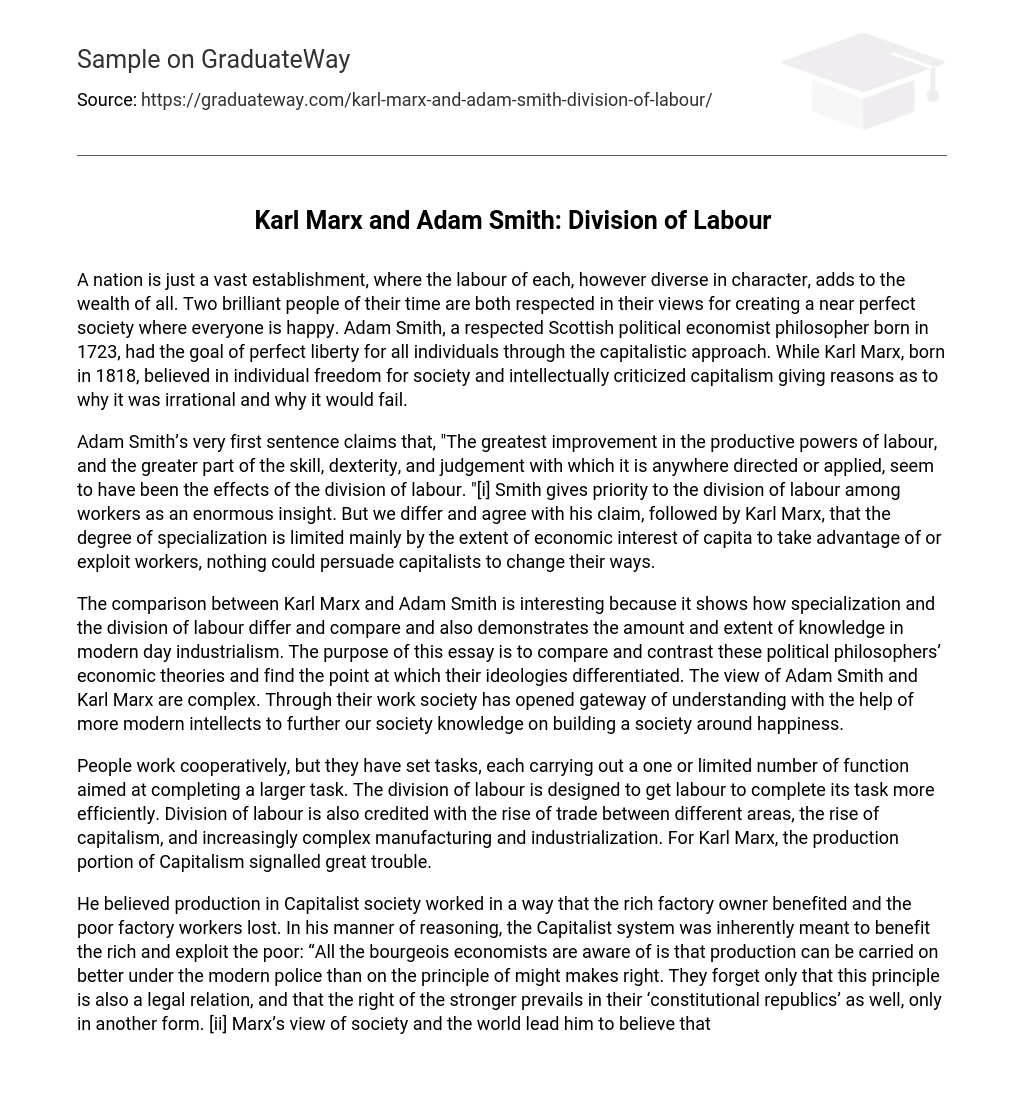Adam Smith and Karl Marx, two influential figures, had contrasting views on creating a prosperous society. Smith, a Scottish philosopher born in 1723, advocated for capitalism to achieve absolute liberty. On the other hand, Marx, born in 1818, emphasized individual freedom and critically analyzed the irrationality and inevitable downfall of capitalism.
Adam Smith asserts that the division of labor is the primary factor in enhancing labor’s productivity and advancing skill, dexterity, and judgment. This concept is considered revolutionary. Nevertheless, we agree with Karl Marx that the level of specialization is mainly influenced by the economic interests of capital, resulting in worker exploitation. Convincing capitalists to alter their practices is unlikely.
Comparing Karl Marx and Adam Smith is intriguing because it reveals the differences and similarities in specialization and the division of labor. It also demonstrates the depth of knowledge in contemporary industrialism. The essay’s purpose is to compare and contrast the economic theories of these political philosophers and determine where their ideologies diverged. The perspectives of Adam Smith and Karl Marx are complex, and their contributions have improved our understanding of society with help from modern intellectuals, thereby enriching our knowledge for building a society focused on happiness.
Cooperative work in which individuals have assigned tasks is aimed at efficiently completing a larger task. The division of labor enhances productivity and is responsible for the development of trade, capitalism, and advanced manufacturing. However, Karl Marx viewed the capitalistic production process as problematic.
According to Marx, in a capitalist society, the wealthy factory owners benefit while the poor factory workers suffer. He believes that the capitalist system is designed to favor the rich and exploit the poor. Marx argues that bourgeois economists recognize that production is more efficient under a modern police system compared to a system based on strength alone. However, they fail to acknowledge that this principle of might also exists as a legal relation in their constitutional republics, albeit in a different form.
Marx’s perspective on society and the world leads him to believe that humans bring about change through practical actions in the tangible world. On the other hand, Smith’s “Wealth of Nations” states that dividing labor improves society because specializing in one specific skill allows for greater efficiency than a single worker attempting multiple tasks. This is due to the fact that one worker may not possess all necessary skills for completing an entire product.
Smith argues that it would be more efficient to have a larger number of workers who are specialized in specific tasks of a product. He illustrates this point by mentioning the example of pin makers. Smith witnessed a small factory where a few men were attempting to perform three different operations each. However, because each man was limited to their own task, the overall productivity was slow and ineffective. In contrast, if each individual were to learn and master all the skills required for pin making, they could contribute effectively in their part and allow their fellow workers to focus on their own specialized tasks. This would lead to a significant improvement in production speed and efficiency.
Like Marx, Smith recognized the significance of production. Smith argued that production was vital for a growing economy. In Smith’s ideal society based on free trade, regular individuals could establish businesses without government interference, and consumers would purchase goods from these producers at prices determined by supply and demand. Smith maintained that the natural function of the free market was dictated by the basic laws of supply and demand. This division of labor facilitates the seamless and organic combination of economic efforts to create national wealth. While animals only fulfill their individual needs directly, humans produce goods to exchange them for other desired items. As a result, the community experiences a tremendous increase in wealth, and division of labor becomes the true source of progress and well-being by promoting cooperation among all individuals to satisfy their desires. This straightforward relationship between supply and demand is the inherent mechanism of the free market that enables its natural flow and efficiency.
The market, if left to its own mechanics, will only allow the most competitive consumers and producers to remain viable. It has the ability to self-correct errors and bring the economy back to equilibrium in cases of shortages or surpluses. While writing this essay on Karl Marx and Adam Smith, I gained significant knowledge on the impact of their ideas, particularly those of Smith, on our current economy. Marx had profound insights into economic workings and extensively pondered the technical aspects of economics.
Despite the overshadowing effect of his radical political theory and influence on past violent communist leaders, Marx’s writings provide valuable insights into the mechanisms of labour. The concepts of supply and demand and the division of labour, which are prevalent worldwide, can be found in his works. In contrast, Smith’s economic and moral theories, although different from Marx’s, are highly respected and widely utilized in the teachings, analysis, and application of modern free-trade economic systems today.





